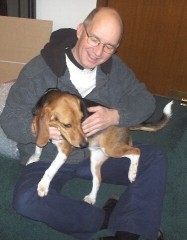The Unclean Spirit Came Out of Him
(Homily for Fourth Sunday in Ordinary Time, Year B)
In today’s Gospel we hear about a man tormented by an unclean spirit which causes uncontrollable outbursts. At first glance, it seems like we are entering strange world, far removed from our own. Nevertheless, when we think about it, it may not be as distant as it first appears. We often read in the newspaper about fellow humans who act under some inexplicable compulsion, who do things almost unimaginable. Moreover, we know people who appear quite ordinary, yet who are gripped by self-destructive addictions. Indeed, most of us have that kind of experience, at least during some stage of our lives. We may not identify it as an “unclean spirit,” but we find ourselves in the thrall of some power which seems beyond our control. And it is not uncommon for people with great mental abilities to fall victim to some irrational compulsion.
I would like to use an example from one of the greatest geniuses of modern times. I mentioned him last Sunday – the Russian novelist, Feodor Dostoevsky. He is known as the “master of the human heart” on account of his penetrating psychological insights, but he had great difficulty mastering his own emotions. A “demon” which afflicted him was a gambling addiction. One day he had entered a casino and placed a bet at the roulette wheel. He won – and it seemed like he had stumbled on the solution to his terrible financial troubles. However, he did not stop when he was ahead; he kept playing and wound up losing everything. Leaving the casino, he pawned his ring and watch and his coat. Then he proceeded to lose that money as well.
Afterward, he felt miserable, not just because of his losses, but because he had given into a frenzy which drove him to act recklessly. He resolved to never gamble again. To his wife he swore that he would quit, but that turned out to be a promise she would hear over and over. Dostoevsky’s gambling not only plunged him into ever deeper debt; it jeopardized his marriage and his family. This pattern continued for many years.
One day things changed. Dostoevsky had scraped together a sum equaling a few hundred dollars. He carefully calculated what part he would risk and what part he would save. As always, the frenzy overtook him and he not only bet everything, but pleaded with fellow gamblers to loan him money, offering them some item of clothes as collateral. About nine-thirty in the evening, he emerged from the casino, full of remorse. He decided to seek a priest to make a confession. In the distance he saw what looked like a Russian church. When he finally got there, it turned out to be a Jewish synagogue. He later wrote, “It was as though I had cold water poured over me. I came running home…” From that day forward, he never entered another casino.
We do not know exactly what happened to Dostoevsky that night, but somehow his addiction was broken. It certainly had something to do with his desire to confess his sins and seek Christ’s forgiveness. And it was as if an unclean spirit had been cast from him. He entered into some of the most productive – and happiest – years of his life.
When we see such things happen - and we do, even today – we can only marvel and react as did the townspeople of Capernaum: “What is this? A new teaching with authority. He commands even the unclean spirits and they obey him.” Jesus can also liberate you – and me.
**********
Final Version
Spanish Version
From the Archives:
Fourth Sunday, Year B, 2009: Free of Anxiety
2006: The Unclean Spirit Came Out of Him
2003: Why Don't Priests Get Married?
Seapadre Homilies:
Cycle A, Cycle B, Cycle C
Bulletin (Catholic Schools Week, World Marriage Day, Pope's First Encyclical)
Announcements
Planned Parenthood hires Baptist Minister to grant forgiveness for future sins (The article, basically a puff piece for Planned Parenthood, reveals more than it intends.)
If you knew nothing of human biology, you could listen to most debates about abortion and never realize that men are involved in any way. We talk about the woman’s body, the woman’s right to choose: but what about the father? Women almost never choose abortion when the father wants their child, and wants to help out. Yet we hardly ever speak of the absent or unsupportive father when we talk about abortion. All too often, women demand the “right to choose” because of men who will not take responsibility for their choices.
We may not have rescued any children, but we did rescue a puppy:

Home

